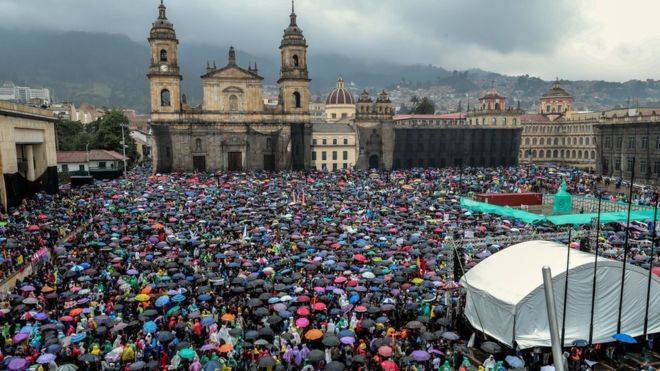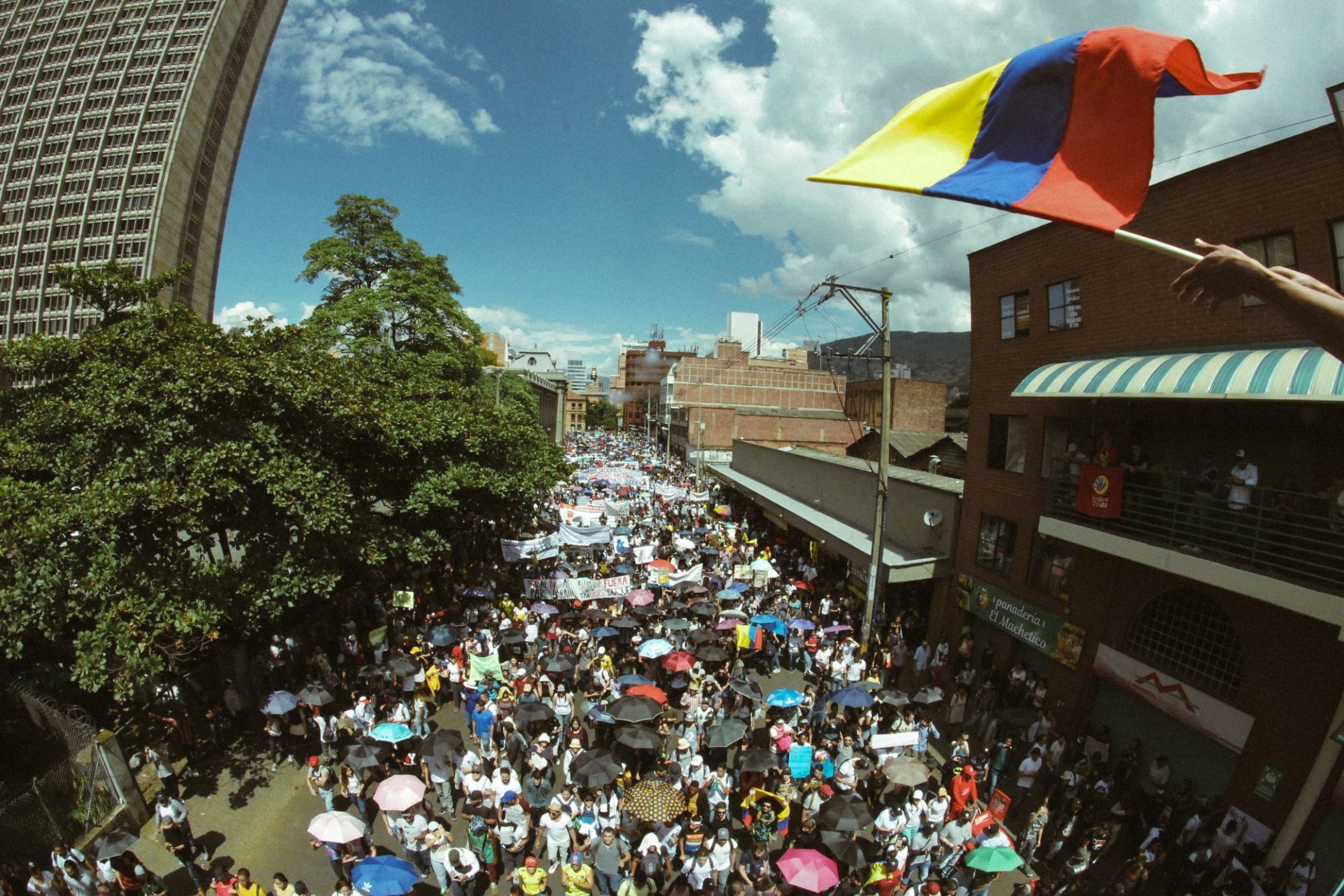
Clashes in Colombia as Hundreds of Thousands Protest Against Government
Joe Parkin Daniels / Guardian UK
BOGOTA (November 22, 2019) — Hundreds of thousands of Colombians have taken to the streets in a show of support for the country’s embattled peace process with leftist rebels – and to protest against its deeply unpopular government.
Pensioners, students, teachers and union members joined marches across the country in one of biggest mass demonstrations in recent years.
In the capital, Bogotá, police helicopters whirred overhead, while riot police fired teargas at protesters who had blocked bus routes before dawn. Despite torrential rain, thousands of people thronged the city’s historic Plaza de Simón Bolívar, singing the national anthem.
The marches began in Bogotá largely without incident, although a few clashes broke out near Bogotá airport between protesters and riot police around midday. As the rain cleared, more confrontations broke out across the city in the early evening. Explosions could be heard across the city. Teargas was fired in the Plaza de Simón Bolívar and at the campus of the National University, where protesters battled with security forces.
The national strike was prompted by proposed cuts to pensions weeks ago. Though the reform was never formally announced, it became a lightning rod for widespread dissatisfaction with the government of President Iván Duque, whose approval rating has dropped to just 26% since he took office in August last year.
Protesters also expressed anger at the perceived slow-walking of the rollout of the country’s historic 2016 peace deal with the leftist Revolutionary Armed Forces of Colombia (or Farc) rebel group. That accord formally ended five decades of civil war that killed 260,000 and forced more than 7 million to flee their homes.
Others say Duque has done little to protect social leaders and indigenous people, who are being murdered at alarming rates. Public fury has also been stoked by a recent airstrike against a camp of dissident rebel drug traffickers, which left eight minors dead.
“We live in a country that kills children, that kills social leaders, with a government that is against peace,” said Alexandra Guzmán, a businesswoman who hires ex-Farc members to work at her furniture workshop. “That is why we have to change something. We cannot continue to live like this.”
And as in Chile, which has been mired in more than a month of unrest, many in the expanding middle classes feel left behind as the economy continues to grow.
“It is not the economy that is growing like Duque and his friends say. It is the profits of the bankers that are growing, which means that they are draining the economy,” tweeted Gustavo Petro, an opposition senator who ran against Duque for the presidency last year, ahead of the march.
“I’m marching today because my generation need a pension when we grow old,” said María Rodríguez, a student who was marching with her colleagues. “We have to stand up for our rights.”
The marches were mostly peaceful, although clashes broke out near Bogotá airport between protesters and riot police.
In the past, such protests have failed to attract large turnouts, which activists attribute to a fear of being demonized as hardline leftists or rebel sympathizers.
“We have fought for generations to make sure we are no longer persecuted to speak,” said Mafe Carrascal, a prominent activist who attended the marches in Bogotá. “The peace process gave us a big tailwind in showing that to support peace is not to be a defender of the guerrillas.”
Also in attendance was Jacqueline Castillo, a mother whose brother was murdered by the army before being falsely declared an enemy Farc combatant – one of thousands of so-called “false positive” killings that plagued the country from 2002 to 2008. Some reports say the practice may have returned.
“We aren’t scared to fight for justice and peace, and we’ll take to the streets until we get it,” Castillo said. “The people do not surrender, dammit!”

November 23, the Night that Colombia’s Anti-government Protesters Defeated Repression
Adriaan Alsema / Colombia Reports
BOGOTA (November 24, 2019) — Fed up with violent repression, peaceful anti-government protesters massively took to the streets in Bogota on Saturday, occupied the capital’s central square and kept President Ivan Duque awake all night.
The nightly protests seemed the deathblow to Duque’s three-day attempt to violently repress the protests and ignore the people’s demands.
Tens of thousands of protesters took both the central Bolivar Square and the Hippies’ Square in Chapinero with a vengeance.
Enough of Duque’s BS
On Friday, police violently repressed protests at the central square, Mayor Enrique Peñalosa issued a curfew and the Bogota Police Department treated the city’s residents to a night of state-sponsored terror as police and vandal associates vandalized neighborhoods and terrorized its residents.
When Bogotanos found out at dawn that the police had allegedly been paying vandals to sow terror, the plot backfired and again the people massively went downtown.
When the loathed ESMAD anti-riot unit shot the 18-year-old Dylan Cruz into a coma, the floodgates opened for real and police was forced to back away.
Droves of Bogotanos took their pots and pans to the streets for one of the loudest protests in Colombian history.
They tried to infiltrate and couldn’t. They tried to shut us up and couldn’t. They tried to create panic and succeeded, but the next day Colombia woke up even more. There is not left or right here, this is the people who want equality. — Twitter user
To make it crystal clear who was boss, thousands more gathered before Duque’s private residence in Usaquen, chanting “murderer” at the “sub-president” and “paramilitary” at Duque’s far-right political patron, former President Alvaro Uribe.
After three days of repression, the inhabitants of Colombia’s capital made it clear they were going to be heard and not a million cops were going to stop them.
Duque in the Corner
As thousands of people gathered in front of his home, Duque announced he would begin talks with newly elected local politicians on Sunday to negotiate an end to the strike.
Meanwhile, strike organizers and citizens began organizing more protests for Sunday to make sure the president stays in his corner.
With a second day of national strikes planned for Monday, Duque can expect to be presented the bill for 15 months of misrule and three days of repression when he meets with empowered labor unions.

‘Orchestrated Terror’ Campaign against Citizens
Adriaan Alsema / Colombia Reports
(November 23, 2019)— Colombia’s capital Bogota on Saturday welcomed dawn after a night of terror, carried out in apparent collusion with the police. In a video message, Bogota Mayor Enrique Peñalosa told residents around midnight that the violence was part of “an orchestrated campaign to create terror.”
Bogota Police commander Mayor General Hoover Penilla, whose subordinates were filmed while taking part in the violence, only barely kept a straight face when Peñalosa told residents to “not fall in this terror trap.”
“THIS IS A STATE SET-UP,” immediately trended on Twitter as only few were able to sleep.
The violence began earlier on Friday as Colombia entered its second day of national protests against the government of President Ivan Duque. In response to the violence, the president and Peñalosa agreed to impose a curfew and to call in the military.
At around 8PM, Duque took to television to announce that he would seek increased military involvement and intelligence to “increase security” in all of Colombia. Four hours later, Peñalosa said the sudden outburst of violence in Bogota was a trap. . . . When the sun came up, many were enraged about why their own security forces were involved in what the mayor called an “orchestrated campaign to create terror.”
Posted in accordance with Title 17, Section 107, US Code, for noncommercial, educational purposes.